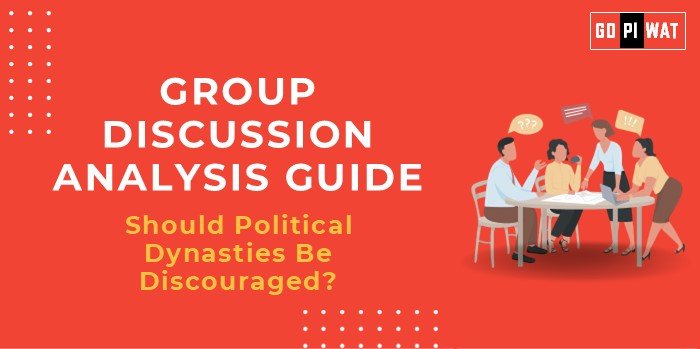📋 Group Discussion (GD) Analysis Guide: Should Political Dynasties Be Discouraged?
🌐 Introduction to the Topic
- 📖 Opening Context: Political dynasties are often criticized as antithetical to democratic values, yet they remain prominent in many democracies, including India, the Philippines, and the United States.
- 🌍 Background: Political dynasties refer to families where multiple members dominate political office across generations. Critics argue that they undermine meritocracy and breed nepotism, while supporters claim they bring experience and continuity.
📊 Quick Facts and Key Statistics
- 🇮🇳 India: 29% of MPs in the Lok Sabha belong to political families (PRS Legislative Research, 2023).
- 🌏 Global Context: The US Congress includes legacy politicians like the Bushes and Kennedys.
- 📈 Impact on Elections: Candidates from political dynasties enjoy a 15-20% electoral advantage (Brookings Institute).
- 📉 Public Sentiment: 68% of Indians view dynastic politics as a threat to democracy (Lokniti-CSDS Survey, 2022).
🤝 Stakeholders and Their Roles
- 🏛️ Political Families: Drive influence and continuity but may hinder new talent.
- 👥 Citizens: Must weigh the trade-offs between experience and meritocracy in elections.
- ⚖️ Election Commission and Judiciary: Responsible for fair elections and ensuring meritocratic systems.
- 📢 Media and Civil Society: Act as watchdogs, raising awareness about the effects of political dynasties.
🏆 Achievements and Challenges
✨ Achievements:
- ✅ Continuity: Policies often benefit from the experience of established political families.
- 📜 Global Examples: The Kennedy family played key roles in US politics during the 20th century.
- 🌱 Local Representation: Political families often maintain strong grassroots connections.
⚠️ Challenges:
- 🚫 Nepotism: Limits opportunities for outsiders and undermines meritocracy.
- 📉 Policy Stagnation: Risk of prioritizing family interests over public welfare.
- 🌏 Global Comparison: Countries like Sweden and Norway rank higher in meritocratic governance.
💡 Structured Arguments for Discussion
- 📢 Supporting Stance: “Political dynasties ensure continuity and provide seasoned leadership with strong political networks.”
- ❌ Opposing Stance: “Dynasties undermine democracy by concentrating power within families, reducing fair competition.”
- ⚖️ Balanced Perspective: “While political dynasties bring experience, they must not overshadow merit-based leadership.”
📌 Effective Discussion Approaches
🎯 Opening Approaches:
- 📊 “Political dynasties dominate India’s legislature, with nearly a third of MPs hailing from political families.”
- ⚡ “Nepotism in politics undermines democracy and stifles fresh talent, as seen in the 2022 Lokniti survey.”
🔄 Counter-Argument Handling:
- 🛠️ Example: “While experience is valuable, democratic systems thrive on equal opportunities and merit.”
📚 Strategic Analysis: SWOT Framework
- 💪 Strengths:
- ✅ Continuity.
- 🌱 Strong local networks.
- ❌ Weaknesses:
- 🚫 Nepotism.
- 📉 Lack of fresh ideas.
- ✨ Opportunities:
- 📜 Policy reforms for merit-based systems.
- ⚠️ Threats:
- 📢 Democratic backsliding.
- 👥 Voter disillusionment.
🎓 Connecting with B-School Applications
🌐 Real-World Applications:
- 📊 Relevant for courses in governance, ethics, and leadership.
❓ Sample Interview Questions:
- ❓ “How do political dynasties impact democratic systems globally?”
- 💡 “Can family influence in politics ever be beneficial? Why or why not?”
📈 Insights for Students:
- 📖 Importance of ethical leadership.
- 🌟 Lessons in balancing tradition and innovation.


